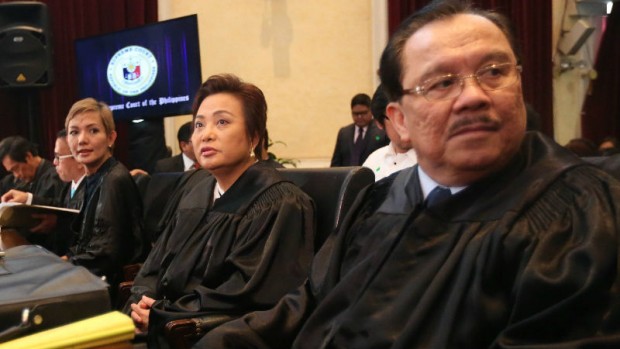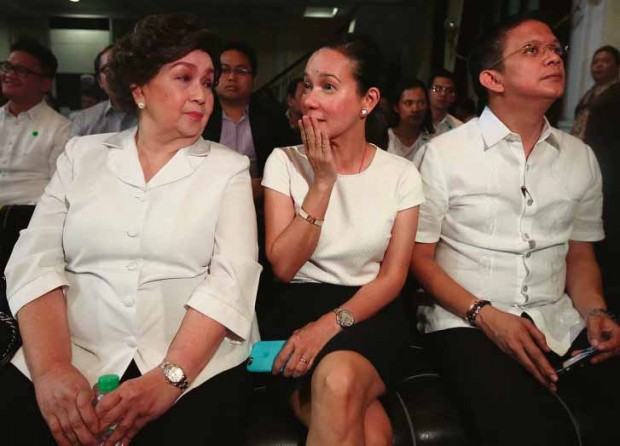SC justices grill Poe’s lawyer

THE INQUISITION Comelec Commissioners Rowena Guanzon (center) and Arthur Lim present a stern demeanor at the start of the oral arguments at the Supreme Court on Tuesday to discuss Sen. Grace Poe’s petitions against the poll body’s cancellation of her certificate of candidacy for President. MARIANNE BERMUDEZ
WHO saw that she was actually born here? Why did she acquire US citizenship in the first place? Why the mistake in declaring her period of residency?
Based on questions propounded, the odds appeared stacked against Sen. Grace Poe when her legal team faced the Supreme Court Tuesday for three and a half hours in a bid to convince the magistrates that she should be allowed to run for President in the May elections.
From circumstances surrounding her birth to her motives for coming back to the Philippines after spending much of her life in the United States, Poe’s citizenship and residency were scrutinized in detail.
The questions to her counsel, Alexander Poblador, boiled down to whether the electorate’s options for President should include a candidate with dubious qualifications.
Associate Justice Mariano del Castillo first asked why Poe had, after staying in the United States for 10 years, felt the need to become a full-fledged American and give up her allegiance to the Philippines in 2001?
Article continues after this advertisement“She could have just stayed there. There was no compulsion for her to become an American citizen,” Del Castillo told Poblador during the first round of oral arguments on Poe’s petition against Commission on Elections (Comelec) orders disqualifying her from the presidential race.
Article continues after this advertisement“She had a good life here, she has a famous and affluent mother, she lived in a very affluent neighborhood (in the Philippines). I couldn’t see any reason why she had to give up her Philippine citizenship,” he said.
Poblador explained that Poe wanted to help her Filipino-American husband, Neil Llamanzares, whom she married in 2001, secure the family’s finances.
“After the 9/11 attacks, there was a strong regulation against foreigners … It was difficult for permanent residents to find jobs … The only way to do that was to become naturalized,” Poblador said.
Del Castillo inquired why it took Poe four years to renounce her American citizenship in 2010, when President Aquino appointed her as chair of the Movie and Television Review and Classification Board.
“[She] waited here for four years. Perhaps she was testing the waters, we don’t know, I want to find out. Maybe if things didn’t happen as she wanted, perhaps she could have gone back there (the US),” the justice said.
The magistrate also asked the lawyer on the senator’s return to the Philippines on May 24, 2005, the date on which the presidential candidate’s camp insists she had reestablished her residency in the Philippines.
Poblador explained that Poe had returned to the Philippines as a balikbayan, a one-year visa for foreigners who are originally from the country.
But for Del Castillo, such cast doubt on Poe’s intent to reestablish domicile in what she calls her homeland.
“You’ve decided to relocate yourself. She wants to reacquire domicile and abandon the US. So why a balikbayan visa? Why not something more permanent to show her true intent that she wants to remain here for good?” Del Castillo said.
Poblador then explained that it took less than a year for Poe to reacquire her Filipino citizenship and that, after returning to Manila, she only needed to travel to the United States to dispose of the family’s assets, including their house, and stayed there for 40 days.
De Castillo also asked why Poe had mistakenly declared the period of her residency as “six years and six months” when she ran for the Senate in 2013. That would bring her total period of residency by the May elections to nine years and six months, short of the 10-year requirement for a presidential candidate.
The Poe camp is now insisting that Poe’s entry in her 2013 certificate of candidacy (COC) was a miscalculation, as she should have counted from the day of her return to Manila with the full intention of residing in the Philippines for good: May 24, 2005. According to Poblador, Poe’s “actual residence” in the Philippines by Election Day this year is 10 years and 11 months.
Poblador acknowledged that Poe realized her error on her 2013 COC only last year, when an opposing party, Vice President Jejomar Binay’s United Nationalist Alliance, raised the matter.
“You know, it’s quite confusing,” said Del Castillo, on why Poe sought to correct the mistake only last year.
The Constitution explicitly requires that presidential candidates be natural born and have a 10-year residency in the country.
Poe insists the issue is her human right to be recognized as a foundling. “Our belief is strong that the law will side with us and our fight for the right of foundlings,” she said in a statement issued to reporters Tuesday. “I just cannot accept what a few say that a foundling will be regarded as being stateless or having no nationality from birth.”
Vague circumstances
Legal eagles say foundlings are granted citizenship but not of the natural-born requirement expressly provided in the Constitution for presidential candidates.
The hearing will resume on Tuesday.
Associate Justice Teresita Leonardo-de Castro took Poblador right back to the start of the controversy: the vague circumstances of Poe’s birth.
De Castro is among three Supreme Court justices who, as members of the Senate Electoral Tribunal (SET), had voted against Poe’s qualification for the 2013 senatorial race in November, holding that Poe, as a foundling, is not natural-born.
SET members Associate Justices Antonio Carpio and Arturo Brion also voted against Poe in the closely decided case, which is separately being tackled at the high court on the appeal of petitioner Rizalito David. Together, the three justices deviated from the majority ruling that Poe is a natural-born Filipino and hence qualified to hold public office.
Brion was the only magistrate absent in Tuesday’s proceedings as he was on sick leave.
De Castro just could not be convinced that, despite her unknown parentage, Poe should be considered a natural-born citizen by virtue of presumption under the international law on statelessness.
Poe was found as a baby at a church in Jaro, Iloilo, in 1968. She was later adopted by actors Fernando Poe Jr. and Susan Roces.
Not a birthright
“Nobody can just say that “Oh, I found this child, she is a natural-born Filipino.” There has to be a process to say a foundling is really a foundling,” said De Castro, her tone stern.
She dismissed Poblador’s claim that foundlings are granted natural-born status as a birthright.
“It is not birthright citizenship. Nobody saw where the foundling was born. Nobody can say the foundling was born on that day. Nobody!,” said De Castro, leaning forward on her bench.
She continued: “Who is to say she was born on that date? Nobody saw her being born in Iloilo, so you cannot consider this as birthright citizenship because there is no proof of the date and the place where the foundling was born.”

STAR WATTAGE Movie actress Susan Roces (left), Sen. Grace Poe’s adoptive mother, lends glamour to the proceedings at the Supreme Court on Tuesday, during the oral arguments on Poe’s petitions against the Comelec’s cancellation of her certificate of candidacy for President.With them is Poe’s running mate, Sen. Chiz Escudero. MARIANNE BERMUDEZ
Poblador said the circumstances of how she was found in Iloilo are well known. He said Poe has a foundling certificate, even while “there may be no judicial declaration that she is a foundling.”
De Castro was also incredulous at Poblador’s assertion that Poe should be recognized as a natural-born Filipino by presumption, invoking provisions of international law granting such status to foundlings.
She cited the danger of putting into power a candidate whose qualifications would be under question throughout her term.
“Is it good for our people to vote for someone whose qualification is uncertain and whose qualification can be overturned? Anytime in six years there will be sa sword of Damocles hanging there,” De Castro said.
“The position is the highest position [presidency] … So you want people to vote on the basis of a disputable presumption?” she said.
Poblador countered this was up to Poe’s detractors to prove.
Let voters decide
De Castro told Poblador: “The presumption you are invoking is disputable. It can be overturned anytime … The point is, even under international law, there is no conclusive presumption of natural-born citizenship. There is no such thing.”
Justice Estela Perlas-Bernabe had parallel questions for Poblador on his contention that the Comelec had abused its discretion in disqualifying Poe, as only the Presidential Electoral Tribunal only had such authority.
“So you’re saying if there is no deliberate intent to mislead, the Comelec has no authority at all to rule on the qualifications of a presidential candidate prior to elections. The public has to wait for an unqualified presidential candidate to be voted and only after then can the qualifications be passed upon,” Bernabe asked Poblador, getting his affirmative response.
“You’re advocating a very broad interpretation of the Constitution that insofar as qualifications of candidates you mentioned, where there is an electoral tribunal, the Comelec is powerless, [that] it is only an administrative body,” De Castro said. “Is that rational? So Comelec should just allow nuisance candidates to run?”
In his questioning, Justice Marvic Leonen appeared to support Poe and allow her to run despite her infirmities and to let the voters ultimately make the decision, a point taken by former Chief Justice Artemio Panganiban.
“This court should first evolve a doctrine that we should allow first the people to decide and then we become the final arbiter should there be a contest. Is that not contemplated in the Constitution today?” Leonen interposed. Poblador agreed with him.
Leonen will resume his interpellation in the hearing next week.